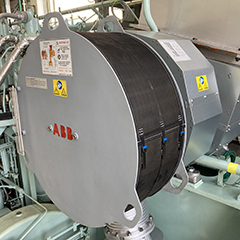Japanese engine builder Makita has selected ABB’s latest low-speed turbochargers for an engine being built for a chemical tanker, marking the first time that a Japanese-built engine will feature the compact, powerful A255-L turbochargers.
The turbochargers will be applied on a 6S40ME-B9.5 engine built by Makita which manufactures MAN engines under the license. The A255-L is designed to provide high turbocharging efficiency from a small unit, reducing overall engine size and giving ship designers greater flexibility in engine room design for small bore two-stroke marine engines.
The engine and A255-L turbochargers have completed shop tests and will be delivered to the shipyard today. Makita’s tests confirmed good turbocharger performance across the entire load range, with turbocharger efficiency exceeding 70%.
Makita is a leading builder of small two-stroke engines and places a strong focus on reliability and economic performance. The A255-L is designed based on ABB’s long-established A200-L and provides benefits both in capex and opex by reducing the turbocharger footprint. The turbochargers are designed to be compatible with NOx and SOx abatement technologies, helping shipowners comply with future regulation on air pollution and greenhouse gas emissions.
A Makita spokesperson said: “As an engine manufacturer, downsizing, weight reduction and high turbocharger efficiency are very important. A highly reliable turbocharger is particularly important for chemical tankers as service opportunities are limited. The A255-L fully meets our needs. The high efficiency of the turbocharger will have a positive effect on fuel consumption and contribute to making the engine more competitive in the global market.”
Alexandros Karamitsos, Head of Global Sales Low-Speed Turbochargers, ABB, said: “Japan is a key shipbuilding market and Japanese engine builders are renowned for their high standards and attention to detail. Coming at a time when cost pressures are increasing, the order from Makita demonstrates both the high performance and the competitiveness of A255-L.”
The A255-L is designed mainly for smaller vessels of 10,000-40,000 dwt that use small bore two-stroke engines. Typical vessels include bulk carriers, tankers and car carriers, many of which are built at Japanese shipyards.
ABB Turbocharging is a global leader in turbocharging technologies and digital optimization solutions for engines ranging from 500 kW to more than 80,000 kW. Its installed base of more than 200,000 turbochargers and a network of more than 100 service stations worldwide.
Process Automation: ABB’s Process Automation business is a leader in automation, electrification and digitaliza-tion for the process and hybrid industries. We serve our customers with a broad portfolio of products, systems, and end-to-end solutions, including our #1 distributed control system, software, and lifecycle services, industry-specific products as well as measurement and analytics, marine and turbocharging offerings. As the global #2 in the market, we build on our deep domain expertise, diverse team and global footprint, and are dedicated to helping our cus-tomers increase competitiveness, improve their return on investment and run safe, smart, and sustainable operations.
ABB (ABBN: SIX Swiss Ex) is a leading global technology company that energizes the transformation of society and industry to achieve a more productive, sustainable future. By connecting software to its electrification, robot-ics, automation and motion portfolio, ABB pushes the boundaries of technology to drive performance to new lev-els. With a history of excellence stretching back more than 130 years, ABB’s success is driven by about 105,000 talented employees in over 100 countries. www.abb.com



























